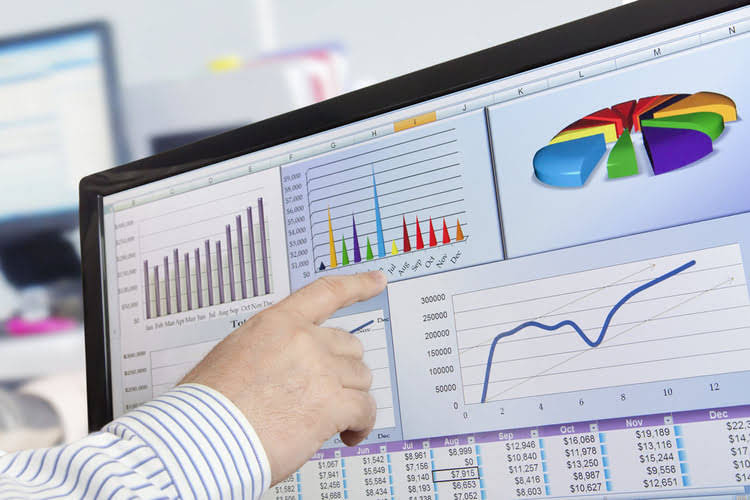
Bookkeeping and accounting are both crucial for the financial health of a business, but they serve distinct purposes. Bookkeepers focus on recording daily transactions and maintaining financial records, while accountants analyze this data to prepare financial statements and offer strategic advice. Both roles are essential for effective financial management and compliance with regulations. In conclusion, understanding the differences between bookkeeping and accounting is vital for businesses and individuals involved in financial management. Bookkeeping focuses on recording and organizing financial transactions, while accounting encompasses a broader scope involving analysis, interpretation, and reporting of financial information. Both roles are critical in maintaining accurate financial records, ensuring compliance, and providing valuable insights for decision-making.
Growth Trends
Accountancy training includes learning how to interpret financial reports and make projections to meet a company’s goals, while bookkeeping training is focused on maintaining accurate records. Accounting is the process of keeping financials for a company Online Accounting by recording, summarizing, analyzing, advising, and reporting. Certified Public Accountants (CPAs) usually perform accounting and assurance tasks. Their work focuses on the big picture of your company’s financial health, ensuring long-term success through strategic planning and analysis.

Compliance and Regulatory Requirements
To qualify for the title of an accountant, generally an individual must have a bachelor’s degree in accounting. For those that don’t have a specific degree in accounting, finance degrees are often considered an adequate substitute. If you are an external auditor, you will most likely have a job at a public accounting firm, and you will need to have a CPA license, plus a college degree, and often a master’s degree. For a long-term career, accounting offers much more upward mobility and income potential. The education required to be competitive in the field is greater, but the payoff down the road can be considerably higher. It is not an unusual career move for a bookkeeper to gain experience at a job, study, get certified, and work as an accountant.
Accounting Vs. Bookkeeping: The Essential Partnership Between Them
Understand the distinctions between bookkeeping, accounting, and accountancy, and how each function supports financial management and business decision-making. Forensic accounting focuses on investigating financial records for signs of fraud, theft, or legal disputes. These accountants use specialized techniques to find missing money or prove financial wrongdoing.
Professional Bookkeeper Certification Course
They also provide insights about the company’s overall financial health to business owners and other stakeholders. Cloud-based accounting software and platforms provide instant access to up-to-date financial information, allowing businesses to make informed decisions promptly. Accountants analyze the financial data compiled by bookkeepers to gain insights into the financial performance and health of the company. They interpret the financial statements, identify trends, and provide meaningful reports and analyses to management.
- They also ensure that business operations comply with relevant laws and regulations.
- Typical bookkeeping tasks involve recording transactions, maintaining journals, reconciling bank statements, processing payroll, and generating periodic financial reports like trial balances.
- This article breaks down what each role involves, how they differ, and why both are important in keeping your business financially sound.
- Bookkeeping involves recording and organizing a company’s financial transactions.
- With automated data entry and transaction categorization, the time required for manual record-keeping has been significantly reduced.
- Ultimately, it is subjective, and some individuals may find bookkeeping more or less stressful based on their personal preferences and abilities to manage workload and pressure.
Accounting, on the other hand, involves a comprehensive accounting process that goes beyond just recording transactions. They provide crucial insights that can aid in decision-making and strategic planning. Accounting How to Run Payroll for Restaurants and bookkeeping are both critical aspects of sound business financial management, but the two roles differ. Bookkeepers primarily handle business recordkeeping, while accountants create financial statements, prepare tax returns, analyze cash flow strategies and more. We’ll highlight the differences between these financial professional roles to help businesses decide the best way to handle their books and taxes.
Knowledge of Accounting Principles and Regulations
Bookkeeping forms the backbone of accurate financial records by meticulously documenting every transaction. It’s the process that keeps all financial data organized, whether it’s receipts logged for expenses or payments tracked for accounts receivable. Without accurate bookkeeping, your business’s financial foundation risks becoming unstable. For example, accountants might conduct cost analyses, prepare financial forecasts, manage compliance with financial regulations, and offer advisory services based on financial health reports. Bookkeeping is the process of recording and organizing your business’s financial data on a regular basis. It focuses on the routine tracking of all income and expenses, creating a clear and accurate financial picture of what’s happening day to day.

Businesses that neglect proper accounting and bookkeeping practices risk financial instability, compliance issues, uninformed decision-making, and missed opportunities for growth. what is the difference between accounting and bookkeeping Bookkeeping can be defined as the systematic recording, organizing, and maintenance of financial transactions of a business. It involves keeping a detailed record of all incoming and outgoing financial activities, such as sales, purchases, payments, and receipts, in a chronological order.
- Bookkeepers generally need strong attention to detail, data entry skills, and proficiency in bookkeeping software.
- This enables the business owner to focus on core activities such as business development, strategy, and customer relationships.
- Bookkeeping focuses on recording financial transactions, maintaining ledgers, and ensuring accurate financial data entry.
- Although accounting and bookkeeping seem to go hand in hand, they’re not as similar as some may think.
- Accounting is the broader financial discipline that is all about analyzing, interpreting, and reporting a company’s financial transactions and overall financial health.
How Do Bookkeepers and Accountants Collaborate to Ensure Effective Financial Management? – Bookkeeping vs. Accounting

It provides a comprehensive view of a business’s financial performance and ensures well-informed choice-making for stakeholders. Because of their deep familiarity with accounting reports and their analytical training, accountants often provide several kinds of complex financial advice and practical management advice. A good accountant helps a company prepare for slow seasons, taxes, and unexpected expenses. Planning also involves checking if the business can afford to grow, hire, or invest in new equipment.